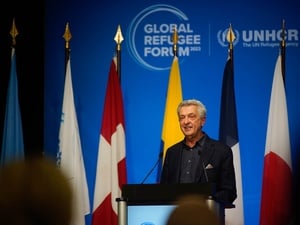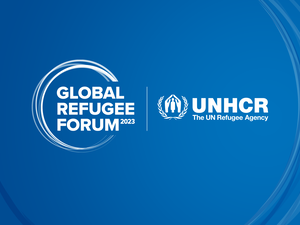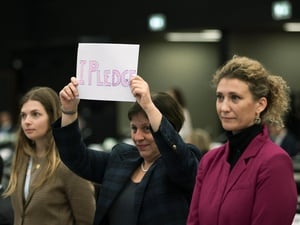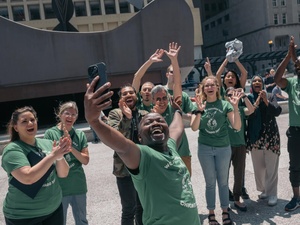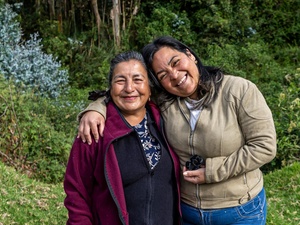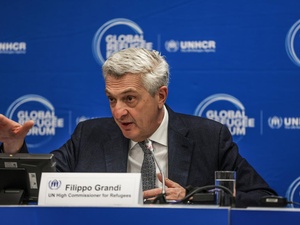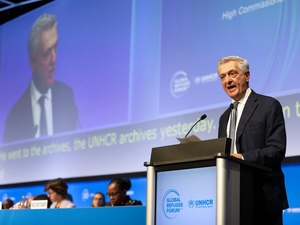States urged to build on progress made since Global Refugee Forum
States urged to build on progress made since Global Refugee Forum
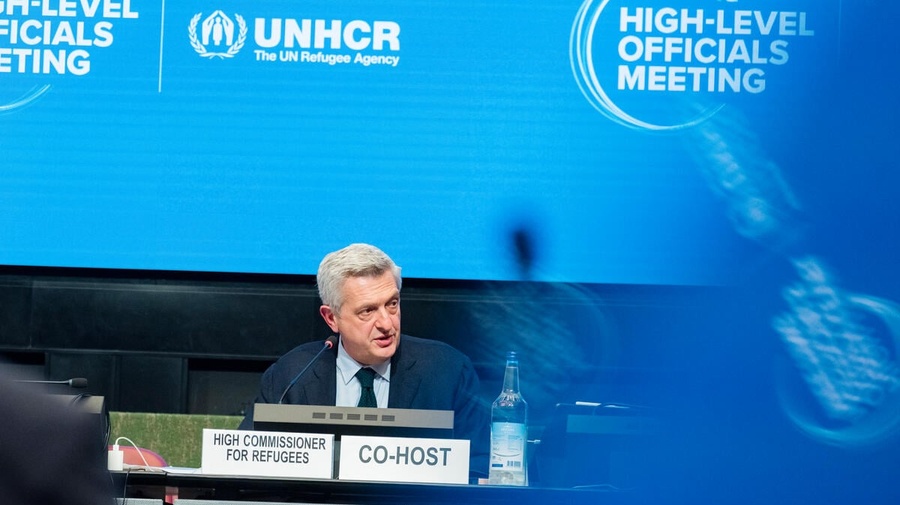
UN High Commissioner for Refugees Filippo Grandi makes his closing remarks at the High-Level Officials Meeting taking place virtually in Geneva.
Governments and other stakeholders have made encouraging progress in meeting their commitments to finding new ways to support the world’s 84 million forcibly displaced people and the communities hosting them, UN High Commissioner for Refugees Filippo Grandi said on Wednesday.
The assessment came at the end of a two-day meeting of senior government officials, refugees, private sector representatives and other stakeholders to take stock of progress towards meeting pledges made at the 2019 Global Refugee Forum. More than 1,400 pledges were made at the Forum – and another 200 since – to transform the 2018 Global Compact on Refugees into action.
Grandi welcomed the achievements made since then despite the devastating impact of the COVID-19 pandemic, and urged governments and other stakeholders to redouble their efforts in the spirit of “true responsibility sharing and solidarity” ahead of the next Forum in two years’ time.
“I was very impressed by a lot of what I have heard, in spite of all the challenges, in terms of the progress made,” Grandi told participants at the virtual High-Level Officials Meeting. “If you’re not convinced, look at the statements by the host countries … We heard statement after statement updating on the pledges that they made two years ago,” he added.
“We heard also from donors that responsibility sharing from their point of view is also happening; financially, yes – and of course we always need to do more – but also in terms of policy, in terms of practical support,” he added.
To maintain the momentum, the High Commissioner said more now needs to be done to find solutions for refugees, internally displaced and stateless people, and to ease pressure on countries with fewer resources where most of them reside.
“The call from host countries is very clear: they need better resourcing; they need further humanitarian and development help,” the High Commissioner said. “We need to do this in a spirit of solidarity – put people before politics. Without meaningful responsibility sharing, we will not achieve solidarity.”
Two of the most visible ways that nations can show their commitment to responsibility sharing is by ensuring access to asylum for people forced to flee, and by providing more resettlement places for refugees, Grandi said.
The message had also been stressed by Ignazio Cassis, President-elect of event co-hosts Switzerland, who said: “Meeting the objectives laid down in the Global Compact on Refugees … requires greater predictability and fairness in allocating displaced people between countries.”
Despite not being intended as a pledging conference, during the meeting more than 50 new pledges and initiatives were announced by states, international organizations, non-governmental organizations, faith groups, the private sector, city networks and others. These included commitments by the United States and Belgium to increase resettlement places and other pathways to entry for refugees.
There were also new pledges to tackle the issue of statelessness, including a promise by the US to adopt a determination procedure to give those without a nationality in the country a legal status and greater rights. Other initiatives on statelessness were announced by Iceland, Belgium, Burundi and Eswatini.
Further pledges in areas such as financing, civil documentation, asylum capacity support, and access to education, health care and other services were made by countries including Austria, Burundi, the Netherlands and Kyrgyzstan.
And among other initiatives led by cities, NGOs and the private sector, UNHCR, the UN Refugee Agency, signed a memorandum of understanding with Community of Sant’Egidio – a faith-based organization active in 73 countries – to establish a framework for better humanitarian access and strengthened operational responses to refugee crises.
Despite being held virtually due to COVID-19 concerns, the event attracted more than 1,300 online participants. More than 130 refugees were invited to participate, and they made frequent calls for increased involvement in decision making that affected their lives and futures.
"Refugee crises are not impossible."
“We have already proven to be meaningful actors, not merely beneficiaries,” said Nathaly Raquel Machado Velasco, a member of the Tertiary Refugee Student Network from El Salvador now living in Mexico, who delivered a statement on behalf of 30 refugee-led organizations.
“Refugee participation is not only an ethical imperative but allows us to bring our knowledge and experience into policy formulation and decision-making,” she added.
Asma Rabi, a youth researcher and Afghan refugee living in Pakistan, urged decision-makers to see young refugees as allies in addressing the challenge of global displacement.
“I firmly believe that refugee crises are not impossible – it’s manageable,” she said. “It needs policies, and it needs solutions. As long as we have access to those conversations, we can help.”
"We can make a difference in people's lives."
As well as individual pledges, several new joint initiatives were announced including the Refugee Environmental Protection Fund, which will provide innovative financing for reforestation and clean fuel projects in refugee hosting areas. The Refugee Connected Education Challenge, meanwhile, will aim to boost digital learning and connectivity for refugees and internally displaced students.
The International Finance Corporation-UNHCR joint initiative on Private Sector Solutions for the Displaced and Their Hosts will facilitate the participation of businesses as partners and investors in economic opportunities for refugees and their host communities.
Looking ahead to the next Global Refugee Forum – due to be held in December 2023 – Grandi warned that the political discourse in many countries around asylum as well as the economic fallout from the pandemic meant that a successful outcome is far from guaranteed.
“But if we work together, we can make a difference in people’s lives,” he promised. “If we come to the Global Refugee Forum … with more responsibility sharing, with more spirit of solidarity, we will not have achieved everything, but we will keep hope alive. And this is what matters most – for us, but most significantly for people on the move.”



